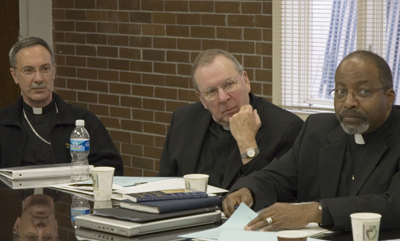
 CHARLESTON—Throughout the province of Atlanta, which includes five separate dioceses, there are over 100 international priests serving in the parishes.
CHARLESTON—Throughout the province of Atlanta, which includes five separate dioceses, there are over 100 international priests serving in the parishes.
These men come from all over the world, with a wide range of languages and cultures, and often end up feeling very lonely as they try to acclimate to life in America.
Bishop Robert E. Guglielmone said he would like to take steps to help them and the congregations they serve.
“We need to make priests feel accepted and prepare them adequately to minister in American culture,” he said.
To that end, the bishop hosted an acculturation initiative at the Cathedral of St. John the Baptist center on Nov. 12, which was attended by representatives from the Archdiocese of Atlanta and the dioceses of Charleston, Charlotte, Raleigh and Savannah.
The program was led by Sister Margaret John Kelly, executive director of the Vincentian Center for Church and Society at St. John’s University in New York. She spoke about the complicated issues of international priests and delivered an overview of the center’s annual acculturation seminar.
Acculturation is defined as a process in which members of one cultural group adopt the beliefs and behaviors of another group.
Sister Margaret first became interested in the issue in 1999, when she was asked to help a priest struggling to adjust to the many changes he encountered in the United States.
She started researching the topic and in 2001 began the acculturation program, which covers everything from communication to psychology.
She said almost all international priests go through a period of culture shock, which can last a year or more.
First is the sightseeing phase, when everything they see is wonderful and the people are interested and friendly, Sister Margaret explained.
Then, involvement in the congregation and parish life begins and everyone becomes aware of cultural differences, and the priest begins to feel unsure of himself and what is expected.
Next, she said, come feelings of shock over not fitting into the culture and a desire to return home.
Finally, priests learn to move forward, to pray, make friends, ask questions and share cultures with their parishioners.
Sister Margaret said the province or the separate dioceses can make this process easier for everyone involved through the acculturation seminar.
Bishop Luis R. Zarama, auxiliary bishop of Atlanta, said it needs to be a mutual learning process. The international priests are here to help, and American priests need to be welcoming, and open to teaching them and learning from them, he said.
Although language is the most obvious barrier to effective ministry, other differences can present a daunting challenge.
Father John J. Forbes, chairperson of the priest personnel committee from the Diocese of Raleigh, said sometimes priests arrive and must immediately learn to drive a car for the first time. Or, as Father Edward Branch from the Archdiocese of Atlanta said, in some countries an hour is a long drive, while in the United States, that’s only the beginning of a road trip.
At the end of the day, Bishop Guglielmone asked everyone to take the premise of an acculturation seminar back to their respective dioceses, reflect upon it, share it with others, and decide what direction the province should take.
Also participating in the meeting were Charlotte Bishop Peter J. Jugis; Msgr. David D. Brockman, vicar general, and Father Carlos Arce, vicar for Hispanics, from the Diocese of Raleigh. Sister Patricia Brown, SSMN, represented the Diocese of Savannah for Bishop Kevin J. Boland.
Msgr. Christopher Lathem, vicar for clergy, and Larry Papineau, coordinator of the Office of Priest Personnel, also attended from the Diocese of Charleston.
